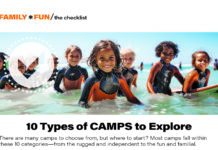
A traditional overnight camp experience with cabins by the lake, s’mores around the campfire, friendship bracelets and team-building activities may not resonate with every child. But there are many overnight camps—plus some day camps—in the Mid-Atlantic that add unique elements designed to be challenging, stimulating and take kids out of their comfort zones.
How would your child like to feed a giraffe or meet a salmon-crested cockatoo? What confectionary masterpieces could they create out of their favorite snacks and candy?
These scenarios are not only straight out of your child’s imagination, but actual activities offered by some camps in the Philadelphia area, including a zoo camp, an edible crafting camp and a sports broadcasting camp.
Whether your campers already hold an interest in skills like sports broadcasting or designing a robot fit for Mars or they’re looking to broaden their horizons, these camps support learning and an enriching summer experience in many different environments.
Elmwood Park Zoo Camps
Close to 700 kids come to Elmwood Park Zoo Camps in Norristown, Pennsylvania, every summer, where children of all ages do animal-related activities.
Children ages 3 to 5 have a slower-paced half day of camp that involves zoo walks and exploring the zoo, with many opportunities to ask questions. Older campers spend time engaged in specific themed activities and lessons on what it’s like to be a zookeeper, which can prepare them for a possible future in animal management, wildlife studies or veterinary sciences.
Nikole Koenig, the camp program coordinator and educator at Elmwood Park Zoo, says all campers get to meet the zoo’s “Ambassador Animals,” which include ball pythons, skunks, rabbits, chinchillas and Argentine tegus, a species of lizard.

“Our campers love animals; that’s why their parents send them,” Koenig says. “They know their kid can talk for hours, and hours and hours about animals. I was that kid. All of my coworkers were that kid. We really love to amplify that trait in kids.”
She says the zoo’s day camp is both fun and educational. Lessons are taught outside with the animals, and some of the lesson plans are based off of Next Generation Science Standards, a student-centered approach to learning.
One week at camp focuses on extinction and endangered species, and Koenig says she ensures that campers walk away knowing the name of at least one dinosaur and one endangered animal at the zoo, plus one way to help that animal in the wild.
The oldest group of campers, ages 9 to 12, delve into animal diet and training, even having the opportunity to meet zoo animals up close with daily giraffe feedings.
Koenig says growing up as an animal enthusiast, she enjoyed spending time with like-minded peers at a nature summer camp: “It was a really fun way for me to share all the knowledge I had about all the things I loved about animals and being outside.”
“When I went to more of a soccer or a sports camp, those kids didn’t really vibe with me,” Koenig recalls. “It’s a very specific type of kiddo that wants to come and hang out at the zoo every week. We really love having them all together.”
She says animal lovers form connections with others and learn from one another.
“I don’t know anyone that doesn’t have a good time at the zoo,” she says. “It’s always something new, always something fun to see.”
Play by Play Sports Broadcasting Camp
For one week over the summer, children and teens ages 10 to 18 don’t play sports; they become mini sports reporters, anchors, podcasters, radio announcers and more.

Jeremy Treatman remembers being a young boy with a passion for sports. Wanting to make that dream a reality for others like him, he founded Play By Play Sports Broadcasting Camp, which has a dozen locations nationwide, including in Philadelphia and North Jersey.
“We pretty much do everything in sports,” says Treatman. “We have kids who come with a variety of interests in sports broadcasting. They know they love sports, they know they like talking about sports, but then they get a chance to focus [on a specific skill set].”

Sports lovers get to experience play-by-play, anchoring, sideline reporting, podcasting, sports talk radio, sports arguing and interviewing in stations they rotate through over the course of three days. Campers are sometimes confident that they want to pursue one skill, then realize at camp that they want to pivot to another area of sports broadcasting, Treatman says.
“We want to make sure that we expose them to every single thing,” Treatman says.

More than 100 former campers now work full-time in sports broadcasting as adults, Treatman says. Even if a camper doesn’t pursue a career in sports broadcasting, he says they still leave camp with improved confidence and public speaking skills.
In addition to hands-on experience in the field—literally—campers have gotten to meet and learn from their heroes, including former basketball pro Charles Barkley, sports reporter Malika Andrews and sportscaster Kenny Albert.
For Treatman, he thinks kids should gain as much experience as they can. Sports broadcasting is a lifelong passion that he is now offering to the next generation.
“I’m a dreamer,” Treatman says. “I believe in helping kids go for their dreams, and that’s really what the camp’s all about.”
Camp Zeke
Camp Zeke, in Lakewood, Pennsylvania, is the first and only overnight summer camp where children celebrate healthy, active lifestyles. The 7- to 17-year-old campers engage in activities around fitness, sports, cooking, gourmet food and Jewish joy.
Older campers at Camp Zeke can structure their own days based on their interests. So, if yoga and relaxation isn’t their thing, there’s always running or strength training with a personal trainer.
Or your child can get their hands messy in the kitchen using fresh produce and ingredients, some sourced locally from nearby farms. Café Zeke, the campers’ eating area, does not serve typical cafeteria food. Instead, chefs make most of the meals from scratch with fresh, nutritious ingredients; that means no processed foods or preservatives.
Also notable is that Camp Zeke always offers a vegan, gluten-free and dairy-free food option. Gone are the days of worrying about what your child will eat at lunches and dinners when they’re away at camp. What other summer camp do you know that offers a rotating dinner menu including barbeque, pesto pasta, ratatouille with roasted tofu and spicy Thai sweet potato stew? Of course, you can’t forget the staples like good old mac ‘n’ cheese and chicken fingers.
Your camper just might return home with lots of tasty new recipes and a penchant for cooking, if you’re lucky.
The Candy Laboratory

If you’ve ever told your child not to play with their food, a day camp for candy and food crafting could be right up their alley. Most kids at traditional camps only interact with food during snack and lunch times, but The Candy Laboratory, in Ardmore, Pennsylvania, offers two-hour sessions in which children make edible crafts and play candy-related games.
Elyse Shapiro, The Candy Lab’s chief confectioner, started the camp and party venue in 2022, which has now expanded to a second location in Haddonfield, New Jersey. Projects include fruit-themed paintings, candy necklaces and mosaics and edible sculptures.
“It’s different and unique,” Shapiro says. “It’s an art camp, but it’s not using paint or clay or paper; it’s using something different, which is food.”
She adds that campers—children ages 6 to 12—can eat their creations or take them home to show their families.
“They love it,” Shapiro says of the campers.
One of Shapiro’s favorite crafts at camp is “bears in the swimming pool.” Campers spread blue frosting onto a graham cracker base and line the edges with round candies to form the “pool.” They add a Teddy Graham cracker in the “pool” with a Life Savers gummy as a pool floatie.
The last step is to add a cocktail umbrella to finish off the summery theme, Shapiro says.
Although she and the kids enjoy the edible crafting, which demonstrates that you can get creative with many different materials, Shapiro says The Candy Lab is “definitely not a camp you would want to go to all summer long.”
Delaware AeroSpace Education Foundation
If your young astronaut is ready to shoot for the moon, maybe it’s time to sign up for a program with the Delaware AeroSpace Education Foundation (DASEF), where your teen will gain galaxies’ worth of newfound knowledge. The two camps held overnight at University of Delaware challenge teens with hands-on activities and problem solving. These small team activities give your teen practice in collaborating with peers and a new perspective on today’s high-tech world.
Destination Moon, for children entering grades seven through nine, combines real-world experiences with lunar studies and lessons in crystal development, advanced rocketry, remote sensing, robotics, computer simulation, composite materials and telescope building.
Destination Mars, for those entering grades eight through 10, is more advanced. Campers design a robotic vehicle and rocket, solve a critical life support issue, construct a spaceship underwater and conduct in-flight experiments in both a Mars simulator and on field trips.
DASEF’s space camps may broaden your teen’s horizons to pursue a career in science, technology or engineering, or at the very least, prevent summer boredom from setting in by working through fun, real-world challenges. Who knows, you might have the next Neil Armstrong right at home.






